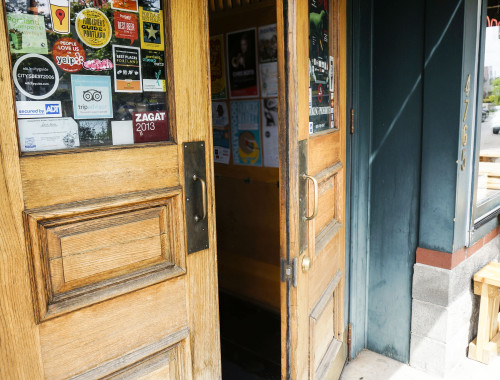Last week a friend asked me to attend a sobriety meeting with her. As it turned out, she had to bring a friend or family member to this one as part of the program’s exit process. We don’t talk often enough, and this friend of mine rarely asks for help, so I said yes right away.
We met for pho before the meeting, catching up on months of missed news over our salty bowls. Friend had been through a lot since we’d last talked—but then she’d been through a lot pretty much since the day we met some six years ago at the studio where we both then worked.
She is one of the loveliest and most angst-ridden humans I have known in my forty years. I think I knew that the day we met. Friend was sitting with the studio team during my panel interview, a quiet gamine sporting jeweled facial piercings, a flip high pony tail, and immaculate lipstick. I suspected that expertly applied mouth wanted to be loud then, but was holding something in. I would later learn Friend had a voice that could beat back armies, but in that first meeting she focused on keeping her hands busy, her comments few.
She is still that gamine, if a little more sinewy today. My friend’s mid thirties are spiraling her out toward a deeper, wider sense of self. I can feel this in her as we talk. Despite a recent history that would have left me utterly wrecked and gibbering into my soup, she is doing well. And she is discovering day by day what it takes to nurture this wellbeing.
“I’m doing yoga,” she says. “Eating really well. Okay, 90% of the time I’m eating well. I will always, always love McDonald’s cheeseburgers.”
We wrap up our chat, box up our pho, and drive to the meeting where we are ushered into a small room that bears all the paraphernalia of a counselor’s lair. House plants, ample seating, and inspirational card decks buried beneath an avalanche of books.
There are twelve of us attending the meeting: six in the program and six of us here as support. We are a pair of sisters, a woman and her fiancé, friends, a daughter and her dad, father and son, and a pair of brothers with diametric postures—one leaning forward for his knees and the other kicking back, Pan-like, in a pose of assumed ease.
The meeting is not an easy environment for me. Maybe for any of us. We are quiet as the meeting begins—all of us except my friend with her sound-the-heralding-trumpets voice blowing our shared nervousness out of the corners.
“How much paperwork are we doing today?” she blares when clipboards are handed around.
“A lot,” the facilitator answers, sending her a motherly look that feels well practiced.
The meeting’s facilitator is made of strong stuff. This is apparent in her snowdrift face, which shows her age without being lined. It’s apparent in the gracious, firm way she handles everyone in the room. She has been over this recovery ground many times. She knows it well, and yet she will teach the material as if it can be revelatory once again. And of course it can be.
Most of the attendees have also been through this process multiple times. Multiple attempts at sobriety, and still they come and they sit in agonizing, contained discomfort as we cover slides that talk about the walls they will likely hit in their journeys, the tricks they will likely play to break the faith and use again.
I wish I could relax during this meeting, which requires very little participation from me. But I don’t know what to do with my hands. Fold them in front of me? No, that feels nunnish. Sit on them? And my legs… what is the appropriate leg position to indicate my absolute okayness in being witness to one of humanity’s most difficult experiences? Crossed? Splayed? Pretzel contortions under my chair?
But more than this, I wish I wasn’t pretending to be so damn calm. I wish I could express my feelings about addiction and the why do people have to go through this hard, hard shit anyway?
Friend seems to express this stuff well. She is happily jiggling an anxious leg for all to see and blurting out discomfiting, endearing questions such as, “Does anyone have a fork?” (for the leftover pho she must suddenly consume) and “How do we fill out this weird form anyway?”
But I am the great balancer. They will chisel this into my tombstone when I die. I am the person constantly sensing the room’s temperature—it’s energy—and doing all I can to harmonize what I perceive to be out. If people in the room are uneasy, nervous, I am a monk of eternal peace on my chair. If the ambiance is excitable tinged with the thin smoke of mania, I am earth, stone. Immovable range. Or if the scene is heavy and dragging I am miraculously (and annoyingly) chipper as hell.
This is tiring job.
But am I the balancer, really? Or am I a fake? It seems the idiom balancing act was originally a circus term that referenced jugglery performances. It was an act, an illusion. A good juggler creates the illusion of suspending multiple objects in the air at once, but of course the technique is an artful and practiced tossing, grounded again and again in the juggler’s hands.
Can I really balance an environment at all? I have been telling myself I can for a long time, but I am starting to understand that the telling is also an illusion. I searched so hard for that calm, easy space during that recovery meeting with my friend. And even if my backwards approach might somehow have earned me this precious calm, I would only have felt it for myself. I cannot bestow calm, balance, peace, joy, grace, light, dark, or any of it to anyone else. Not really.
And I am not responsible for the energy in the room.
This realization, which is new to me, is a significant step for the chronic balancer I have been. The actor who is addicted to the illusion she feels she must create. Here! You’re feeling anxious? Let me sprinkle on some calm! Dejected? No problem, here is the energy of hope and affirmation from me. Take it! Please! It is my gift, my truest offering.
Nope. It is my excuse. The trick I play to continue to use. My substance use here is illusion. I create an illusion so convincing I have myself fooled. Do I appear to have a calm exterior? I must, then, be calm. Happy face? I must surely be bathed in joy. I use the illusionary act to avoid the real feelings: the anxieties, the rages. The grief and the sneaky, sneaky shame.
If I don’t feel these things here with people who are doing their best to remove the scrim of substance abuse that exists between their lives and their inner, true selves, then I am doing everyone the truest disservice. I am telling them in my body language, my energetic posturing, that it is not okay to feel what I feel. And by that reasoning it is not okay for them to feel what they feel.
Hey, it’s weird to sit in a room of relative strangers and lay your deep stuff bare. Even if you never open your mouth. It’s weird for the world at this point in our history when it seems we have flipped on the light and are seeing all our roaches run for shade.
It’s weird, but we can do it.
And if the people in the meeting can do it… if they can sit in their private anguishes and anxieties and just allow them to be there… If they can still show up to look at one another and murmur a simple, unadorned hello. Then yes, I can do that for relentlessly off kilter me.



